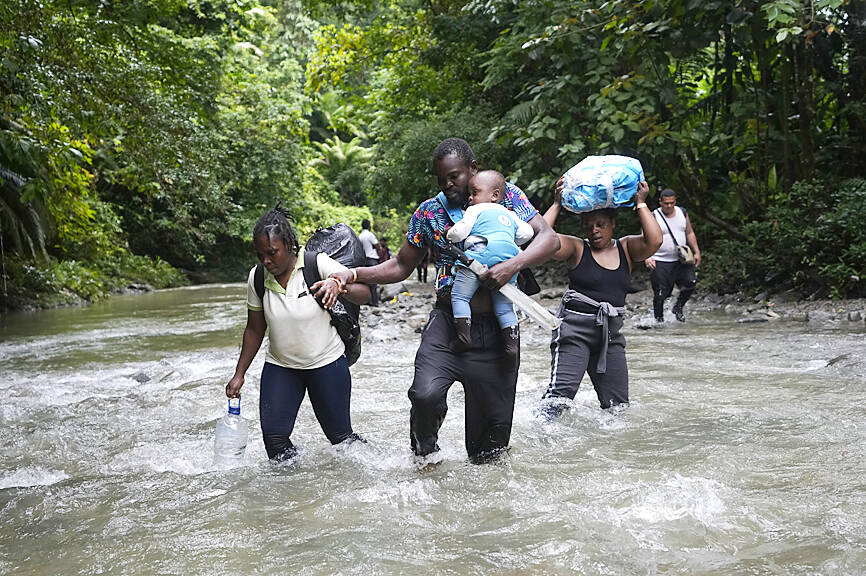The US, Panama and Colombia on Tuesday announced that they would launch a 60-day campaign aimed at halting illegal migration through the treacherous Darien Gap, where the flow of migrants has multiplied this year.
Details on how the governments would try to curb the flow of migrants that reached nearly 90,000 in just the first three months of this year through the dense, lawless jungle were not provided in the joint statement.
The ambitious announcement came as the administration of US President Joe Biden nervously awaits the expected end of a COVID-19 pandemic-related rule on May 11 that has suspended rights to seek asylum for many.

Photo: AP
Without that instrument of dissuasion at the US border, there is concern migrant arrivals could again become unmanageable.
The joint statement said the countries would also use “new lawful and flexible pathways for tens of thousands of migrants and refugees as an alternative to irregular migration,” but again gave no details.
The plan’s third element is investment to reduce poverty and create jobs in the Colombian and Panamanian border communities, presumably so fewer people work at smuggling migrants.
“Recognizing our shared interest and responsibility to prevent the risk to human life, disrupt transnational criminal organizations, and preserve the vital rainforest, the governments of Panama, Colombia, and the United States intend to carry out a two-month coordinated campaign to address the serious humanitarian situation in the Darien,” the statement said.
US Secretary of Homeland Security Alejandro Mayorkas met with the foreign ministers of Panama and Colombia in Panama.
According to the Panamanian government, more than 87,000 migrants crossed the Darien Gap in the first three months of the year, mostly from Venezuela, Haiti and Ecuador. That was up from nearly 14,000 migrants during the same period a year earlier.
Last year set a record for migrants using the Darien route, with nearly 250,000. That increase was driven largely by Venezuelans, who accounted for about 60 percent of the migrants crossing there last year.
The Biden administration responded in October last year by using the pandemic-related rule known as Title 42 to deny Venezuelans the chance to request asylum at the border.
Instead, the US government said it would accept as many as 24,000 Venezuelans at US airports who had already applied and been preapproved through a government online application.
That program was expanded to Nicaragua, Haiti and Cuba earlier this year.
With Title 42 set to expire next month, the US is looking at the Darien Gap as the natural choke point to stop extracontinental migration.
Michael Lee Weintraub, a professor at the University of the Andes School of Government in Colombia, said that with Biden under pressure from conservatives to address immigration ahead of next year’s presidential election, his administration is looking for ways to discourage irregular migration and make legal migration easier.
However, he expressed doubt that Colombia’s security forces have the capacity to dramatically affect migrant smuggling, because the country’s armed groups profit from it and are “very sophisticated.”

Kehinde Sanni spends his days smoothing out dents and repainting scratched bumpers in a modest autobody shop in Lagos. He has never left Nigeria, yet he speaks glowingly of Burkina Faso military leader Ibrahim Traore. “Nigeria needs someone like Ibrahim Traore of Burkina Faso. He is doing well for his country,” Sanni said. His admiration is shaped by a steady stream of viral videos, memes and social media posts — many misleading or outright false — portraying Traore as a fearless reformer who defied Western powers and reclaimed his country’s dignity. The Burkinabe strongman swept into power following a coup in September 2022

‘FRAGMENTING’: British politics have for a long time been dominated by the Labor Party and the Tories, but polls suggest that Reform now poses a significant challenge Hard-right upstarts Reform UK snatched a parliamentary seat from British Prime Minister Keir Starmer’s Labor Party yesterday in local elections that dealt a blow to the UK’s two establishment parties. Reform, led by anti-immigrant firebrand Nigel Farage, won the by-election in Runcorn and Helsby in northwest England by just six votes, as it picked up gains in other localities, including one mayoralty. The group’s strong showing continues momentum it built up at last year’s general election and appears to confirm a trend that the UK is entering an era of multi-party politics. “For the movement, for the party it’s a very, very big

ENTERTAINMENT: Rio officials have a history of organizing massive concerts on Copacabana Beach, with Madonna’s show drawing about 1.6 million fans last year Lady Gaga on Saturday night gave a free concert in front of 2 million fans who poured onto Copacabana Beach in Rio de Janeiro for the biggest show of her career. “Tonight, we’re making history... Thank you for making history with me,” Lady Gaga told a screaming crowd. The Mother Monster, as she is known, started the show at about 10:10pm local time with her 2011 song Bloody Mary. Cries of joy rose from the tightly packed fans who sang and danced shoulder-to-shoulder on the vast stretch of sand. Concert organizers said 2.1 million people attended the show. Lady Gaga

SUPPORT: The Australian prime minister promised to back Kyiv against Russia’s invasion, saying: ‘That’s my government’s position. It was yesterday. It still is’ Left-leaning Australian Prime Minister Anthony Albanese yesterday basked in his landslide election win, promising a “disciplined, orderly” government to confront cost-of-living pain and tariff turmoil. People clapped as the 62-year-old and his fiancee, Jodie Haydon, who visited his old inner Sydney haunt, Cafe Italia, surrounded by a crowd of jostling photographers and journalists. Albanese’s Labor Party is on course to win at least 83 seats in the 150-member parliament, partial results showed. Opposition leader Peter Dutton’s conservative Liberal-National coalition had just 38 seats, and other parties 12. Another 17 seats were still in doubt. “We will be a disciplined, orderly